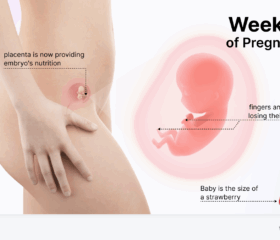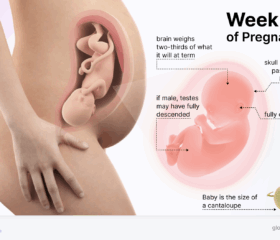Pregnancy Week by Week
6 Weeks Pregnant
Your baby is as big as a sweet pea.
0.25
inches
6 Weeks Pregnant: Symptoms, Ultrasound, and Tips
This week, your baby is beginning to form some of her body’s major systems. But it’s not just her that’s changing—you are, too.
You may still be dealing with some of your uncomfortable symptoms from the past few weeks and might see new ones appear. Let’s find out what you can expect at 6 weeks pregnant.
What does being 6 weeks pregnant really mean?
It sounds crazy, but you might actually be a few weeks further along in your pregnancy than you thought. Don’t feel silly if you’re not totally sure; how pregnancy is measured can be confusing.
Usually, doctors measure pregnancy from the first day of your last menstrual period (LMP), and not from the date of conception. When you reach 6 weeks, it’s actually been about 4 weeks since you conceived (when the sperm met the egg). 1
If you’re confused about what this means for your pregnancy timeline, try plugging the date of your LMP into a due date calculator to get an idea of when you’re (probably) going to deliver.
For more accuracy, your doctor can also calculate your due date with an ultrasound. You may have your first one this week—and if not, it’s probably coming up fairly soon afterward.
Your baby’s development at 6 weeks
While your baby’s still tiny—well under half an inch long, the size of a sweet pea—many of her body’s major systems are forming. Here’s exactly what’s happening at 6 weeks:
- Circulatory system: Your little one’s circulatory system is becoming active, and her heart has already divided into four chambers. In fact, your baby’s heart has started beating, and you might even be able to hear it if you have an early ultrasound this week.
- Eyes, nose, and ears: Slowly but surely, your baby is getting more and more recognizable. Her eyes, ears, and nose are all starting to form. 2
- Brain: Your baby’s neural tube will have closed by the end of this week, with the brain dividing into three distinct sections: the forebrain, midbrain, and hindbrain. 2
- Limbs: Your baby’s arms and legs are starting to grow, although they have a long way to go before they turn into the adorably chubby limbs you’ll see when she’s born.
If you’re curious about how your baby looks at this point, some of the best pregnancy trackers can give you a rough idea with 2D illustrations and 3D models.
What can you see with an ultrasound at 6 weeks?
At 6 weeks pregnant, your doctor may perform an early ultrasound to check on your baby’s development.
You may be able to see a fetal pole, the first sign of the developing embryo that appears on an ultrasound. While your baby’s heartbeat will be faint, you might catch a glimpse of it. 3
If her heartbeat is too faint to see or hear at this stage of pregnancy, your doctor may recommend a follow-up ultrasound a week or two later to get a clearer picture.
Prepare for the chance that you’re carrying multiples
Your 6-week ultrasound may reveal another piece of big news—you’re having more than one baby!
If you have two or more distinct gestational sacs, that’s almost always a sign that you’re carrying twins or multiples (it’s technically possible for twins to share a sac, but it’s rare). Your doctor will confirm whether you need to stockpile even more diapers with further scans down the line.

Your body at 6 weeks
At 6 weeks, you may not have a visible bump yet, but early-pregnancy bloating may make your abdomen feel tighter or more distended, even though your physical changes aren’t yet noticeable to others. If you’re carrying more than one baby, your bump could show sooner than it would with a single pregnancy.
First-trimester symptoms
Your hormonal fluctuations are in full swing in the sixth week of pregnancy, and you might already feel the effects. Common early pregnancy symptoms include: 4
- Fatigue: Your body’s spike in progesterone may leave you feeling unusually sleepy or just plain wiped out.
- Nausea: One of the classic symptoms of early pregnancy is nausea and vomiting, commonly referred to as morning sickness. Unfortunately, you might not just feel nauseous in the morning; this can strike at all hours.
- Sore breasts: Unfortunately, breast pain during pregnancy is all too common. Your breasts may feel more tender, as well as heavier and fuller.
- Frequent urination: Running to the bathroom all the time? Your body produces the hormone human chorionic gonadotropin (hCG) during early pregnancy, which increases blood flow to your pelvic region. As a result, you may need to pee more often.
- Gas or bloating: With your hormones in flux, you might get another unwelcome symptom: excess gas and bloating. 5
- Mood swings: It’s normal to feel emotional during this time as your body adjusts to your increasing levels of hCG and progesterone.
- Cramping and light spotting: Along with increased vaginal discharge during pregnancy, you might get vaginal bleeding or spotting accompanied by cramps. This is common and generally nothing to worry about, but you should speak to your doctor if the pain is severe or the bleeding becomes heavy.
What are the signs of miscarriage?
Unfortunately, some women miscarry in the earlier stages of pregnancy. Once you get past the 6-week mark, this risk drops, and it will further recede after you make it all the way through your first trimester (which ends at the 12-week mark). Make sure you’re aware of the signs of miscarriage, such as: 6
- Vaginal bleeding
- Abdominal pain or cramping
- Fluid or tissue passing from your vagina
Try not to panic if you notice any of these symptoms. Vaginal bleeding, for example, can be a perfectly normal part of early pregnancy and doesn’t necessarily mean you’ve had a miscarriage. Just get yourself to the doctor and give them a chance to figure out what’s going on.
Be aware of ectopic pregnancies
An ectopic pregnancy is when a baby develops outside of the uterus. This can cause severe complications for mothers, such as internal bleeding, so look out for telltale signs, such as: 7
- Abdominal pain (specifically, pain on one side of the pelvis)
- Shoulder pain
- Vaginal bleeding
- Feeling faint or dizzy
Again, having these symptoms doesn’t automatically mean you have an ectopic pregnancy, but you should get to a doctor immediately just to be safe.
How to look after yourself and your baby at 6 weeks
Feeling worn down in your first 6 weeks of pregnancy? Here’s how you can look after yourself and make sure you and your baby keep progressing well: 8
Don’t hold it in
If you need to pee more often, don’t hold it in. Ignoring the urge to go can increase your risk of urinary tract infections (UTIs), which can have dangerous consequences for pregnant women. 9
On that note, you may not want to pour fuel on the fire, but keep drinking plenty of water. Hydration is important, too.
Get comfy
Opt for loose-fitting clothes or stretchy waistbands to accommodate any bloating and reduce your discomfort. You might want to make a trip to the clothing store; looser fits will be able keep up with your expanding belly over the next few months.
Look after your mental health
With your hormones all over the place, it’s normal to experience emotional highs and lows at this stage. Reach out to your loved ones when you’re feeling low, and look into speaking with a qualified therapist if you’re really struggling with your mental health.
Don’t overdo anything
Your body is going through many changes, so take extra care during these early weeks. If you love your morning cup of Joe, you’ll be glad to hear you can still drink coffee when you’re pregnant. However, you’ll need to limit your caffeine intake, as too much can affect your pregnancy.
Also, avoid hot tubs, saunas, or other activities that could expose you to excessive heat, as these could pose risks to your little one.
Adjust your diet
If you’re feeling queasy, you might find it difficult to stick to a perfect pregnancy diet. That’s okay. While you should eat nutritious food and plenty of fiber, it’s also normal if all you can handle are bland or simple foods. Keep easy-to-digest foods like crackers or dry toast nearby to settle your stomach and prevent nausea from becoming overwhelming.
Preparing for your first prenatal visit
As you approach your first pregnancy appointment, make sure to jot down any questions or concerns you may have.
Being prepared ensures you get the most out of your appointment, so ask about your health, your baby’s development, and what to expect in the coming weeks. Make sure you’re keeping track of your symptoms and look into your family health history.
You may find it helpful to use a pregnancy tracker app to record milestones, symptoms, and other important information, as well as stay up-to-date with your appointments and vaccinations (e.g., if you get the flu shot while pregnant).
Look up your blood type (if you can)
At 6 weeks pregnant, you should make sure you know the blood types of mom and dad. 10 This will be helpful in determining whether complications could result from the composition of your red blood cells (e.g., you’re Rh-positive and your partner is Rh negative), and if you’ll need a RhoGAM shot.
If you’ve given birth before or donate blood frequently, you might have this information on file somewhere. Don’t worry if you don’t—it’s relatively uncommon for people to know theirs, and your doctor will perform a blood draw to confirm yours.
Final thoughts
As you enter week 6 of your pregnancy, it’s OK to feel apprehensive, especially if your symptoms are getting you down. While needing to pee all the time or morning sickness can be frustrating, they’re all signs that your baby is doing well.
This week, continue to listen to your body and get plenty of rest. Remember, your doctor is just a phone call away if you need anything. You’ve got this!
Article Sources
- National Health Service. "Due date calculator" Retrieved June 23, 2025.
- Charlotte Lozier Institute. "Week 6" Retrieved June 23, 2025.
- StatPearls. "Embryology, Weeks 6-8" Retrieved June 23, 2025.
- Eunice Kennedy Shriver National Institute of Child Health and Human Development. "What are some common signs of pregnancy?" Retrieved June 23, 2025.
- American Pregnancy Association. "Pregnancy Gas" Retrieved June 23, 2025.
- MedlinePlus. "Miscarriage" Retrieved June 23, 2025.
- MedlinePlus. "Ectopic Pregnancy" Retrieved June 23, 2025.
- UCSF Health. "Coping With Common Discomforts of Pregnancy" Retrieved June 23, 2025.
- American College of Obstetricians and Gynecologists. "Urinary Tract Infections in Pregnant Individuals" Retrieved June 23, 2025.
- American Pregnancy Association. "6 Weeks Pregnant" Retrieved June 23, 2025.







